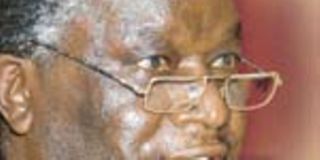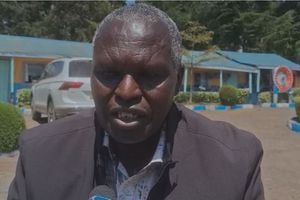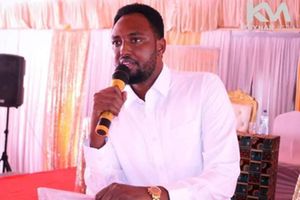Biwott's testimony on the Ouko killing

Mr Biwott

Journalists view a tape showing Robert Ouko addressing a press conference in Washington DC before he was murdered in 1990.
Photo by Joseph Mathenge
Mr Nicholas Biwott – named by Scotland Yard detective John Troon as the prime suspect in the murder of Foreign Affairs minister Robert Ouko in 1990 – finally started giving his side of the story before the parliamentary committee investigating the death.
The MP for Kerio South said he and Dr Ouko were friends and he had nothing to do with his killing. "Those who were involved should be arrested and prosecuted," a composed Mr Biwott said.
"I was wrongly blamed by Troon," he said, adding there was no fight or quarrel between him and Dr Ouko during a visit to Washington DC days before the minister was murdered after returning home.
Nor did he and Dr Ouko have any rivalry over a multi-million-shilling project to revive the Kisumu molasses plant.
"I supported Dr Ouko on the molasses project. We were friends," Mr Biwott told the committee sitting at County Hall in Nairobi and chaired by Mr George Sunguh, the MP for Kisumu Town East.
Mr Biwott was a powerful Cabinet minister under President Moi when Dr Ouko was reported missing from his Koru home on February 12, 1990. Dr Ouko's charred remains were found in the bush at Got Alila on February 16.
Giving his evidence in London last week, Mr Troon said the chief suspects were Mr Biwott and former powerful Permanent Secretary Hezekiah Oyugi.
Mr Troon said the people who accompanied President Moi on the trip to the United States days before Dr Ouko's death should be investigated.
Said the detective, who carried out extensive investigations on the murder from both London and Nairobi: "The death of Dr Ouko was linked to the trip to Washington and, most importantly, corrupt deals within the government of that time."
"I stand by my earlier conclusion 15 years ago that the main suspects in the murder are Oyugi (who died of illness in 1991) and Biwott; I am convinced they played a big role in the murder," said Mr Troon.
He added that Mr Biwott and Mr Oyugi, through police commissioner Philip Kilonzo (now deceased) had tried to block his investigations.
Mr Biwott yesterday said he was happy with the appointment of Mr Sunguh's team and had nothing to do with Dr Ouko's death.
However, his testimony was interjected by heated arguments, forcing the parliamentary committee members to adjourn for consultation several times.
Mr Biwott's close political ally, Bomet MP Nick Salat, was asked to leave the hall when he refused to hand over a document allegedly presented to the committee in confidence by Mr Troon during its recent sojourn in London.
Clad in a grey suit and white shirt, Mr Biwott walked into the hall shortly after 10 am. His lawyers, Mr Desterio Oyatsi and Ms Carolyne Southern, and his own team of detectives, led by Mr Bill White, were there already waiting for him.
Mr Sunguh and MPs Joe Khamisi, Christine Mango, Kiema Kilonzo, National Assembly clerks Sarah Kioko and Nicholas Emejen arrived 30 minutes later.
The committee let Mr Oyatsi give his "opening" remarks and then would start cross-examining Mr Biwott. But soon after, Mr Sunguh accused the lawyer of "purporting to educate a committee of Parliament" and trying to challenge the committee's mandate.
But Mr Oyatsi insisted that his submissions were on matters of law in the proceedings.
"You're treading on dangerous grounds," Mr Sunguh cautioned him. "You want to second-guess what the committee is trying to do!"
Mr Oyatsi said his remarks would determine the nature of Mr Biwott's evidence and that his client was ready for cross-examination by any party affected.
Mr Sunguh overruled Mr Salat when he tried to comment on the committee's procedure because he is not a member.
MPs who are not members of this committee are allowed to attend the sessions as observers but not participants.
Mr Biwott read a summary of his evidence and then insisted on reading it all before he could be cross-examined, which Mr Sunguh rejected.
Mr Biwott said the Ouko Commission of Inquiry, which was in session from 1990 to 1991, was stopped before he could cross-examine Mr Troon and give his evidence.
"Over the years there have been statements over my alleged involvement in the death of Dr Ouko," Mr Biwott said.
He said that he did not get an opportunity to defend himself and had wanted to sue Mr Troon over his evidence but was advised against it by his lawyer.
He recently sought action on Mr Troon by the Scotland Yard but was told both him and Dr Ouko were not British citizens and there was nothing the United Kingdom could do.
His arrest over Dr Ouko's death in 1991, he said, was unjustified, degrading and humiliating.
"I was questioned by police after the arrest and released without charge," he said.
Mr Troon, he said, ignored "crucial and direct" evidence when he linked him to Dr Ouko's death.
"He (Troon) relied on Briner's statement," Mr Biwott said. Ms Marianne Briner is the chairman of BAK Group of Companies which wanted to revamp the Kisumu molasses plant before Dr Ouko died.
Testifying in London last week, Ms Briner claimed she had intimate relations with President Moi and Mr Biwott was not happy about that. She said Dr Ouko had differed with Mr Biwott over a deal to revive the Kisumu molasses plant and the two men had a standoff during the Washington Breakfast prayer meeting in 1990.
Ms Briner said Dr Ouko was preparing a dossier to expose corrupt manoeuvres by some in Moi's Cabinet who wanted to benefit unduly from the Kisumu molasses plant revival plan.
Ms Briner said: "I had a relationship and an intimate one. If I loved someone, it was a tough decision to make. It was an intimate relationship much to the disgust of Mr Biwott. Mr Biwott even told me I would not be like 'those Ugandan girls'. At this stage I wanted to square it out with Mr Moi. Biwott was spending a lot of time with Moi and I would not be happy if someone else came in between, especially if it was a woman."
But yesterday Mr Biwott said he had a statement from Swiss lawyers to prove Ms Briner lied in her evidence.
The Sunguh committee told Mr Biwott to stick to his own evidence, but the former minister said he should be given a chance to highlight his evidence "just like the other witnesses."
Sunguh: This matter is serious. The committee is doing an investigation. It is able to tell what is relevant.
Biwott: I'm not questioning the integrity of this committee. I like it.
Mr Sunguh ordered Mr Biwott to stick to the committee's question-answer mode of interview.
Sunguh: We will be doing double work if you go into details.
Biwott: All I'm saying is if you rely on question and answer, you will only ask me what you want. Troon made a big statement.
Sunguh: Are you challenging the chair?
Biwott: I'm not. I'm appealing to the chair.
Sunguh: You must be firm to the ruling of the chair.
Biwott: If I didn't respect the chair I would not be here. All I want is my right to give evidence. I want this committee to succeed.
Sunguh: We are going to ask questions on the Washington trip and you are free to produce any document.
Kiema Kilonzo (a member of the Sunguh Committee): After we ask if there are areas not covered, the committee will give you an opportunity to address all these areas.
Biwott: All I'm asking is equal opportunity with others. I'm prepared to answer as many questions as possible.
Sunguh: Troon's official report was submitted to Kenyan government.
Biwott: I have come here to support this committee and offer my evidence to the best of my knowledge and ability. Briner gave a statement.
Sunguh: Mr Biwott, because you are adamantly refusing to adhere to the committee ruling, the committee is adjourned.
The committee resumed and Mr Biwott insisted on reading his evidence before cross-examination. Mr Sunguh ruled him out of order and directed that he either follows the committee rules or stops giving his evidence.
"If you have any objections regarding the proceedings we are now going to make a ruling and refer the matter to the Speaker of National Assembly," Mr Sunguh said.
The committee said none of the witnesses had given evidence before cross-examination and ruled out any bias against Mr Biwott.
Mr Biwott later produced a bunch of documents for the committee to peruse and agreed to proceed with his evidence.
However, he was taken to task to explain discrepancies on photographs he had presented to the committee about the US visit.
He said Kenya and US relations before the visit were cordial "as the Foreign Affairs ministry always said."
He said he was unaware of any warning by the Kenyan ambassador to the US, Mr Dennis Afande, that there would be demonstrations if the President went ahead with the visit to Washington DC. "It was a misconception that because Biwott is a total man he knows everything," Mr Biwott said.
"This is not the Biwott people are talking about," he added. His nickname Total Man, he said, arose in Parliament after a visit to Vienna.
"When I came back I was faced with lots of information that Biwott has run away. I responded in Parliament that Biwott cannot run away from the country. I'm a total man," he said.
But MP Oburu Oginga said it was common knowledge that Mr Biwott was leading the kitchen cabinet and former President Moi always consulted him.
"The President was my friend. That kitchen (Cabinet) . . . by the way, I'm not in that kitchen," Mr Biwott said.
Mr Biwott was a deputy secretary in Mr Moi's Home Affairs ministry when the latter was Vice-President. Mr Moi became President in 1979 and appointed him a Minister of State.
The word powerful, he said was used to undermine rather than promote him.
"I did not do things attributed to the powerful minister," he said.
The committee screened video clips of a press conference that Dr Ouko addressed in Washington DC. Mr Biwott said in response to Mr Sunguh's question that he missed the former Foreign Affairs minister.
"The minister was eloquent. He was a good defender of the Kenyan government at the time," Mr Biwott said.
He said Dr Ouko's ability at press conferences was "very good." He denied being jealous of Dr Ouko.
Before returning from the US, he said, Dr Ouko had asked him to employ his (Ouko's) son, Ken.
"God knows what Dr Ouko would be today if he was still alive," Mr Biwott said.
The hearing resumes today.




